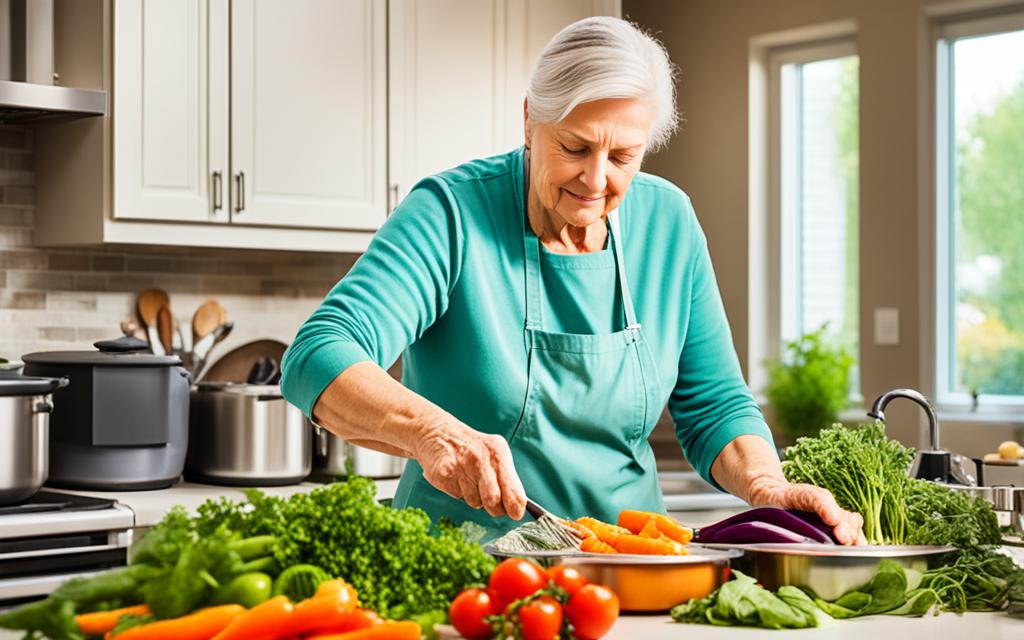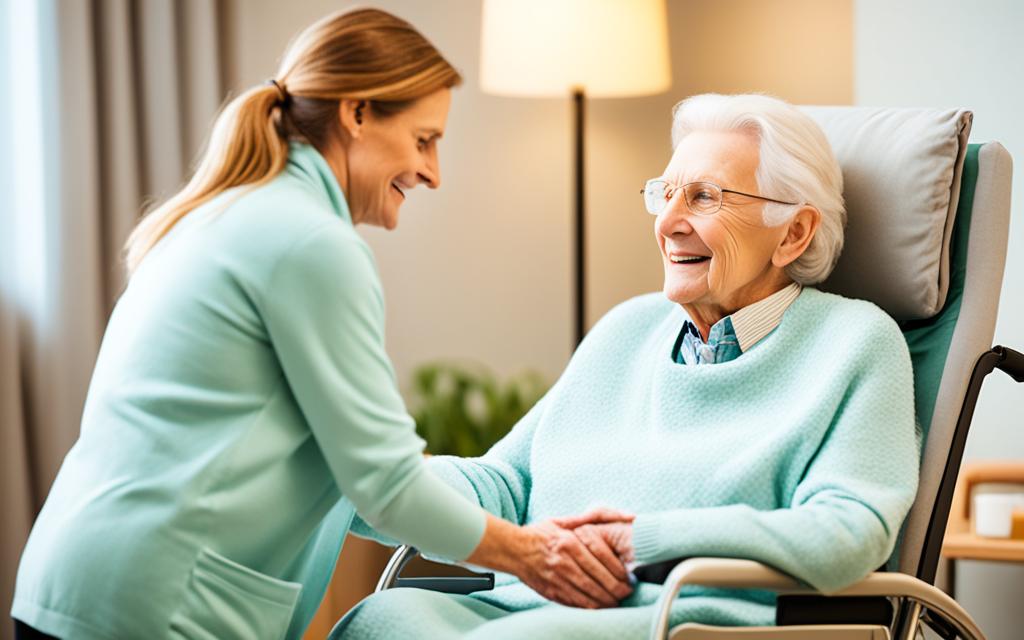Caregiver Job Duties and Responsibilities Explained
Starting a career in caregiving means entering a very important area of healthcare. In thinking about what caregivers do, know that your work is more than daily tasks. You’re committing to make someone’s life better. Caregiver jobs change based on who you help. Yet, they always need kindness and skill. Whether you’re helping someone move or making them feel better, your role is key to your clients’ health.
Learning about what caregivers do is crucial. It forms the core of the healthcare sector. This career asks for flexibility and deep caring. Every task you do shows the influence you have on someone else’s life. Begin this journey knowing how big your role in society can be. You’re not just doing jobs; you become an essential part of someone’s day.
Key Takeaways
- The caregiver job description includes many important tasks for a client’s wellbeing.
- Knowing about caregiver roles helps understand the job’s complexity and its health care importance.
- A caregiver’s main goal is to greatly better the life quality of those they look after.
- Being a caregiver means meeting physical needs and offering emotional support too.
- Caregiver jobs mix empathy, patience, and practical abilities.
- Creating a positive change as a caregiver requires dedication and real care in every action.
Understanding the Caregiver Role
The caregiver role is crucial in healthcare. It deals with the daily and emotional needs of those who need help. Understanding the caregiver role specifics shows us the impact of these committed individuals on others’ lives.
What is a Caregiver?
A caregiver provides vital support to those who can’t care for themselves due to health issues, disabilities, or age. The caregiver tasks cover many areas, including personal care, medical help, and emotional backing. Their role is key in the continuum of care.
The Importance of Caregiving in Healthcare
Caregivers are essential for extending healthcare services outside the clinic to homes and communities. Their heartfelt service guarantees care continuance that clinics can’t offer alone.
Types of Caregiving Situations
It’s important to know the different caregiving situations, as they inform how caregivers work. Here’s a quick look:
| Caregiving Context | Focus Area | Typical Tasks |
|---|---|---|
| In-Home Personal Care | Individual’s Residence | Meal preparation, personal hygiene, accompanying to appointments |
| Assisted Living Facility Care | Assisted Living Facilities | Medication management, daily activities assistance, emergency support |
| Special Care (Disability or Chronic Condition) | Specialized Care Settings or Home | Condition-specific care, tailor-made therapy programs, continuous monitoring |
Whether in homes or specialized settings, the caregiver responsibilities list is long. They ensure people get the dignity, care, and support they deserve.
Redefining Caregiver Responsibilities
Caregivers face growing challenges today. They need to know all about caregiver responsibilities checklist, caregiver daily tasks, and caregiver job requirements. We will explore how they provide both physical and emotional support.
Physical Support and Assistance
Providing physical help is a big part of being a caregiver. They assist with walking, personal hygiene, and other physical needs. These actions are key to the well-being of the person being cared for.
Tasks can vary from simple help moving around to more complicated care. This depends on the health conditions of the person.
Emotional and Social Support
Offering emotional and social support is just as critical. Caregivers need to be good at communicating and listening. They often become close friends with those they care for.
This support helps manage the mental health of the care recipient. It affects their overall health too.
Caregiving requires a mix of empathy, patience, and strength. It’s about improving the life and dignity of those in their care. Understanding caregiver job requirements and daily tasks shows the depth of their role.
Essential Caregiver Duties and Responsibilities
Your role as a caregiver involves many tasks that are key for the well-being of those needing support. Below is a caregiver responsibilities list highlighting the main caregiver job duties and responsibilities. These duties are crucial for maintaining the health, dignity, and quality of life of your clients.
- Monitoring and recording the client’s condition by observing physical and mental health, intake and output, and exercise.
- Assisting with personal care tasks such as bathing, dressing, and grooming.
- Supporting clients in achieving daily nutritional goals, through meal preparation and monitoring dietary intake.
- Ensuring the client’s home environment is safe and accessible, making adjustments as necessary.
- Facilitating transportation to appointments, social events, or errands, enhancing their access to community resources.
- Providing companionship and mental stimulation by engaging in conversation and recreational activities.
- Administering medications as prescribed by healthcare professionals, ensuring timely intake and adherence to medical instructions.
- Communicating regularly with family members and healthcare professionals regarding the client’s status and any changes observed.
Including these tasks in your daily work shows the depth of caregiver job duties, and responsibilities. It reflects a deep commitment to caregiving. Each task is a step towards more effective and caring support for clients.
Assisting with Personal Care and Hygiene
Helping with personal care and hygiene is a key caregiver daily task. It’s crucial for health and boosts dignity and life quality for those you care for. As a caregiver, your approach to these tasks affects your daily duties and your client’s happiness.
Your caregiver tasks include many activities that need a thoughtful and skilled approach. These tasks range from bathing and grooming to dressing and toilet help. Treating each task with respect for privacy and kindness is important for comfort and trust.
- Bathing and showering assistance, including the preparation of bath equipment, and adjusting the water temperature.
- Helping with dressing and choosing appropriate clothes based on the day’s activities.
- Assisting with hair, teeth, nails, and other grooming details, using tools that preserve independence and dignity.
- Support during toilet use or incontinence care with utmost respect for personal privacy.
These caregiver daily tasks need more than just skill; they require a caring heart. Your actions should help those you care for feel normal and independent.
| Task | Description | Frequency |
|---|---|---|
| Bathing | Assist with washing, maintaining a comfortable water temperature and environment. | Daily or as needed |
| Dressing | Help choosing comfortable clothing and assist with all aspects of getting dressed. | Daily |
| Grooming | Assist with hair brushing, nail care, and oral hygiene. | Daily |
| Toileting | Provide support with toileting needs while maintaining respectful privacy. | As needed |
Adding these practices to your routine isn’t just about the physical help. It’s about offering emotional support too. Doing so makes an accepting and cozy environment for those you’re helping.
Managing Medications and Health Monitoring
As a caregiver, you play a key role. You handle medications and keep an eye on health for those you care for. It’s vital to make sure medicines are given right and health is closely watched.
Ensuring Proper Medication Administration
Managing medications well is key to caregiving. It’s about sorting, giving, and watching over meds doctors have prescribed. To do it right, here are some points every caregiver responsibilities checklist should have:
- Checking prescriptions to be sure they’re correct and knowing how much to give.
- Setting times for meds to ensure they’re taken when needed.
- Watching for any negative effects or issues with other meds.
- Keeping track of all meds given and any reactions seen.
Health Monitoring and Record Keeping
Keeping a close eye on your clients’ health is also crucial. Regularly checking things like blood pressure, sugar levels, and heartbeat helps catch problems early. Good records help doctors provide the best care for each patient.
| Vital Sign | Monitoring Frequency | Tools Used | Notes |
|---|---|---|---|
| Blood Pressure | Daily | Blood pressure monitor | Check at the same time each day for consistency |
| Glucose Levels | As per doctor’s advice | Glucose meter | Important for diabetics or those with glucose concerns |
| Heart Rate | Twice a day | Heart rate monitor or manually | Observe for any irregular heartbeat |
Meal Preparation and Dietary Awareness
As a caregiver, you’ll focus on making meals that are both healthy and meet your clients’ dietary needs. This important caregiver task includes a wide span of caregiver job duties and responsibilities. Its goal is to support the health and wellbeing of those in your care through nutrition.
It’s vital to know your clients’ nutritional needs. This goes beyond just meal prep. It means understanding their health issues, allergies, and what they can’t eat. This part of the caregiver responsibilities helps make each meal a step towards better health.
Proper nutrition can significantly impact the recovery and overall health of clients, making this aspect of caregiving both challenging and rewarding.
- Assessment of dietary needs and preferences
- Meal planning based on nutritional requirements
- Preparation of dishes adhering to dietary restrictions
- Monitoring client’s response to various foods
- Adjusting meal plans based on feedback and health changes
Here’s an example of how you can tailor meals to various dietary needs:
| Meal Type | Client Condition | Food Example |
|---|---|---|
| Breakfast | Diabetes | Oatmeal with fresh berries |
| Lunch | Heart Disease | Grilled salmon salad |
| Dinner | Gluten Intolerance | Grilled chicken with quinoa and vegetables |
Preparing meals is more than following health rules. It’s about making tasty meals that make eating a joy. This is key in caregiver job duties, as it improves life quality for those you look after.

Mobility Support and Physical Therapy Assistance
In caregiving, helping people move safely is crucial. Making sure your clients can navigate their space safely is key to caregiver responsibilities list. We will look into how to support mobility and work with physical therapy experts.
Assisting with Movement and Exercises
Good mobility support is knowing what your clients can and can’t do. Caregivers might help with stretching or other exercises. These are based on the client’s health and abilities. Working with physical therapists helps make sure every exercise is safe and helps improve muscle strength and joint function.
Adapting Homes for Accessibility
Making homes easier to navigate is crucial for caregivers. Simple changes can greatly improve life for those with mobility issues. Adding grab bars or changing bed heights can make a big difference. These changes help create a safer living space.
| Accessibility Feature | Benefit | Typical Location |
|---|---|---|
| Grab Bars | Supports safe movements | Bathroom, Hallways |
| Ramps | Eliminates staircase barriers | Entrances |
| Non-slip Mats | Prevents falls | Kitchen, Bathroom |
By using these strategies, caregivers show how important their role is in daily life. This approach helps people live more comfortably and independently. Understanding and applying these methods means providing support that improves lives, not just offering help.
Providing Companionship and Mental Stimulation
Being a caregiver is deeply rewarding. It means making strong emotive connections. These bonds are key to enhancing a client’s well-being. Along with daily tasks, giving mental support and true companionship is crucial. It brightens the lives of those in your care.
Engaging in Conversations and Activities
Your role as a caregiver is more than just physical care. It’s about bringing joy and sparking the mind too. Through puzzles, books, or arts and crafts, you can boost your client’s brain health. Regular, deep conversations are vital. They fight off loneliness and boost mental health.
Understanding the Emotional Needs of Clients
Knowing your client’s emotional and psychological needs is as important as their physical ones. This knowledge builds trust, a cornerstone of caregiving. Pay attention to any changes in their mood or what they like. This way, you can offer support that truly touches their heart.
Incorporating these approaches makes you a better caregiver. It improves your clients’ life quality significantly. Remember, every person you help has unique needs. Adapting your methods to meet these needs is what caregiving is all about.
Transportation and Errands
Being a caregiver means taking on key tasks like driving and doing errands. This includes taking those you care for to doctor visits or the grocery store. It’s all about keeping them safe and making things run smoothly.
Helping with getting around is about more than just physical health. It also helps those you care for stay emotionally healthy. They stay connected to the outside world.
- Scheduling and managing appointments
- Safe transport to and from locations
- Handling grocery shopping and other necessary errands
- Maintaining communication with healthcare providers as needed
Doing these tasks well means being organized and on time. It’s also key to keep a good, detailed schedule. This helps you handle everything that needs to be done.
Here’s a clear outline of what these jobs entail:
| Task | Description | Frequency |
|---|---|---|
| Medical Appointments | Transporting to doctor visits, therapy sessions. | As scheduled |
| Grocery Shopping | Purchasing necessary household and personal items. | Weekly |
| Pharmacy Runs | Picking up prescriptions and other healthcare essentials. | As needed |
This table shows how to plan ahead for transportation and doing errands. This planning means both you and those you care for can relax. You know everything is taken care of.
Following the caregiver responsibilities checklist makes you a trustworthy professional. But it’s more than that. You’re making a real difference in the lives of those you help. Transportation and errands might seem simple, but they’re key to good caregiving. They fit into the big picture of what caregivers do.
Specialized Care for Chronic Conditions
Caregivers who help with chronic conditions need to know a lot and be flexible. Their work has to match the ongoing needs of each person. It’s key to understand what’s needed for effective help and better life quality.
Illnesses like diabetes, heart disease, and arthritis need careful medical, emotional, and lifestyle care. Caregivers must deeply understand how these affect the person and their daily life.
- Medication Management: Making sure medications are taken on time and watching their effects.
- Dietary Planning: Making meal plans that fit specific health and taste needs.
- Exercise and Physical Therapy: Helping with exercises to better the patient’s health and movement.
- Emotional Support: Being a companion and listening, which is key for mental wellness.
Caring for someone with a chronic condition is more than basic care. It affects all parts of the person’s life. This full care helps manage the illness and boosts overall health. It makes caregiver tasks critical in healthcare.
Keep in mind, your work gives more than health support. It offers hope and cheer, too. The expert care you provide is essential in your patients’ lives.
Emergency Response and Crisis Management
In a caregiver’s role, managing emergencies and crises is key. This duty demands quick thinking, readiness, and staying calm under stress. Knowing what to do improves care quality in urgent situations.
Preparation for Medical Emergencies
Being ready for emergencies begins with good preparation. Caregivers need the right skills and tools for sudden medical issues. They should know basic life support, first aid, and the health conditions of the person they care for.
Swift Decision Making in Critical Situations
In a crisis, there’s no time to waste. Caregivers must quickly understand the situation and act fast. Being able to make quick decisions is vital to stop emergencies from getting worse and keeping everyone safe.
- Regular training on emergency protocols
- Up-to-date knowledge of the care receiver’s medical history
- Instant communication with emergency services when required
Below, find a table that lists the key skills and tools for caregivers in emergencies:
| Skills/Tools | Description | Importance |
|---|---|---|
| Certifications (CPR, First Aid) | Validated ability to perform life-saving procedures | High |
| Medical Knowledge | Understanding of common and specific health conditions | Medium |
| Communication Devices | Tools to contact healthcare professionals or emergency services quickly | Critical |
Caregiver Job Requirements and Skills
Being a caregiver requires a lot of skills and understanding. You need to know the caregiver job description well. This job has many tasks like helping with walking, handling medications, and being a good friend. It’s not just about tasks; you must truly want to help people.
Caregiver job requirements are not only about certificates or your past jobs. They’re about having heart qualities like empathy, patience, and strength. Being a caregiver is about your personality and your knowledge. It’s important to keep learning, especially about health care and diseases like Alzheimer’s or Parkinson’s.
Caregivers must be flexible and good at solving problems. Their work can change every day, but it’s always fulfilling. They must be organized and careful, especially with medicine times, food needs, and personal care plans. Being a great caregiver means facing challenges and growing from them. It’s about making a real difference in someone’s life.
FAQ
What are the key duties and responsibilities of a caregiver?
A caregiver helps with moving around and personal care. They manage medications, keep an eye on health, and make meals that are healthy. They offer someone to talk to, emotional support, and keep the brain active.
They handle driving and tasks outside the house. Caregivers are there for people with long-term illnesses, help during emergencies, and always make sure the person they’re looking after is safe and happy.
Why is the caregiver role so important in healthcare?
Caregivers are a big help in healthcare because they provide kind and necessary care to people who need it. They help keep people’s lives happy and healthy. This makes our communities stronger and better.
Can you describe the different types of caregiving situations?
Caregiving can look different for each person. It might be helping someone in their own house, in a living facility, or giving special care for certain illnesses. Each requires different skills and levels of help.
How do caregivers provide emotional and social support?
Caregivers offer friendship and like to have good talks. They enjoy doing activities that make the brain work better. They are good at seeing when someone feels sad and help make a strong, trusting friendship.
What are some of the daily personal care tasks that caregivers help with?
Caregivers help with bathing, getting dressed, and keeping clean. They make sure to respect the person’s privacy and dignity.
How do caregivers manage medications and health monitoring?
Caregivers make sure medications are taken right and on time. They often give the medications too. Checking things like how fast the heart beats and writing down any symptoms are also part of their job. They keep good records for doctors.
What role do caregivers play in meal preparation and maintaining dietary awareness?
Caregivers make sure meals are healthy, safe for any special diets, and that they taste good. They know all about the person’s food needs, dislikes, and allergies.
In what ways do caregivers assist with mobility and physical therapy?
Caregivers help people move safely at home or in facilities. They help with exercises and therapy that doctors recommend. They also make living spaces safer to move around in.
How important is companionship in the caregiving role?
Being a friend is a big part of caregiving. It stops people from feeling alone. Doing fun activities and having good conversations make life better for those receiving care.
What responsibilities do caregivers have when providing transportation and helping with errands?
Caregivers make sure rides are safe. They help with getting in and out of the car. They are good at planning trips quickly. They often join in during errands to help out.
What specialized care might caregivers give to those with chronic conditions?
For chronic conditions, caregivers really understand the illness. They adjust care to fit and often work with doctors. This helps make a care plan that really works.
How are caregivers trained to respond in emergencies?
Caregivers are taught to stay calm, figure out what’s happening fast, and help out right away. They know how to get medical help fast. Being ready to act quickly is key.
What qualifications and skills are required for a caregiver job?
A caregiver job needs some school and training, like CPR. Maybe even a caregiving certificate. They need to be good at understanding others, have patience, and communicate well. Being organized, watchful, and physically able to help are also important.







